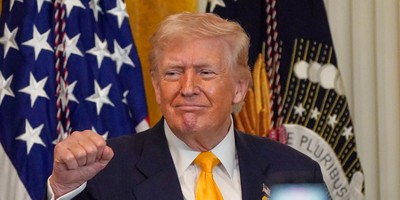After I posted this analysis of the much-discussed "Rule 19" kerfuffle in the US Senate two nights ago, several readers directed me to a floor speech delivered by Sen. Marco Rubio in response to the controversy, which Matt covered yesterday. In a nutshell, Rubio made a case that Sen. Elizabeth Warren had violated a rule that not only governs her legislative body, but also helps make it unique. In case you missed it, here are the Floridian's remarks -- which are characteristically reasoned and eloquent -- followed by a few thoughts from yours truly. The gentleman from Florida has the floor:
I want people to think about our politics here in America, because I’m telling you guys that I don’t know of a single nation in this history of the world that’s been able to solve its problems when half the people in the country absolutely hate the other half of the people in that country. This is the most important country in the word, and people in this body cannot function if people are offending one another and that’s why those rules are in place. The linchpin of that debate is the ability of this institution through unlimited debate and the decorum necessary for that debate, to be able to conduct itself in that manner. And so, I know tonight was probably a made for T.V. moment for some people. This has nothing to do with censoring the words of some great heroes. I have extraordinary admiration for the men and women who led the civil rights effort in this country.
While we're at it, I also think Sen. Tim Scott's speech on the Sessions nomination and the Warren incident is also well worth your time. As I wrote on Wednesday, the Senators who threw the flag on Warren for ignoring a Senate prohibition of impugning the character of a fellow member were within their rights to do so. I still found the enforcement of that rule to be heavy-handed and counterproductive, and I'm skeptical of reports that Republicans are deliberately elevating Warren in the public eye in order to drive a wedge between the Democrats' left-wing base and their vulnerable 2018 "Trump state" Senators. Yes, I can see the rationale for such a gambit, but if that's truly the strategy here, it seems too cute by half. Democrats also played the "elevate the divisive sure-loser" game with Donald Trump, and look how that worked out for them. We can argue about whether it was wise for McConnell et al to drop the hammer on Warren the way they did, but my more lasting point is that I'm not convinced that the portion of the rule they invoked is a good one.
Recommended
Senators are immune from libel and slander laws on the Senate floor, allowing them to launch totally scurrilous and baseless attacks if they so choose. The mercifully-retired Harry Reid frequently so chose. Ted Kennedy, whose words Warren quoted in her offending address, was also a practiced smear merchant. So the upper chamber's rules stipulate that Senators can basically drag anyone's name through the mud for whatever reason unless they're speaking about a fellow member of the club? I'm consistently on the record in favor of civil and measured discourse and agree with Rubio's overall point, but why should the US Senate be a rhetorical "safe space" only for 100 privileged members of an elite class? And it's not as if Warren, a cheap demagogue to be sure, was calling Sen. Sessions 'an ugly SOB who's a disgrace to his family,' or something like that. She was reading criticisms of Sessions' record (arguably quite unfair and uncharitable ones, admittedly) from other people. And she was doing so in the context of a debate over whether Sessions should get a powerful new job in the executive branch. This wasn't gratuitous name-calling in the midst of a prosaic legislative debate. It was an examination of a sitting Senator's credentials and character prior to determining whether to confirm him as the top law enforcement official in America. Is it so wrong to dispense with some of the mandatory "decorum" standards in that context?
Think of it this way: If Sen. Ted Cruz had been recapitulating tough criticisms of Sen. Eric Holder's record, ethics and judgment in 2009 (this is all hypothetical, obviously), and Harry Reid had waltzed in and banned Cruz from further debate, how would the Right have reacted? Here's a less hypothetical what-if: Let's say the Democratic nominee for president beats Donald Trump in 2020. If that new president taps Liz Warren for his or her cabinet, should Republican Senators be barred from raising her self-serving racial hoax in assessing her character and fitness to serve? Or would they be forced sheepishly sweep that entire topic under the rug in observance of Rule 19? Warren would be a sitting Senator, after all. In sum, the relevant provision of the rule in question was intended to maintain civility and comity in the United States Senate. A worthy goal, no doubt. But is that end sufficient justification to stifle criticisms, valid or otherwise, within a confirmation battle? I'd imagine that Rule 19 is very likely to remain in place, but the spectacle of citing it to cut off and reprimand a Senator mid-speech ought to be extremely rare, and limited to truly egregious instances. My view, as usual, the best response to objectionable speech is more speech, not less. By the way, I'll leave you with this absurd inanity. No, they're not, Senator:
Former Sen. Barbara Mikulski defends Sen. Warren: "Whenever women stand up ... they're told to shut up and sit down" https://t.co/EOW28W7xHc
— CNN Politics (@CNNPolitics) February 9, 2017

























Join the conversation as a VIP Member